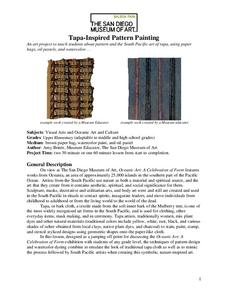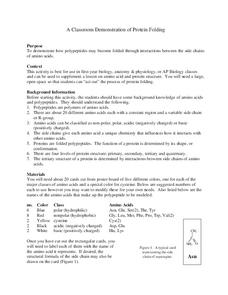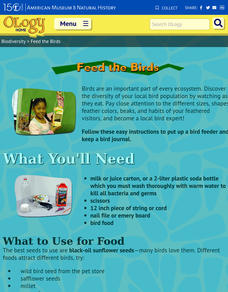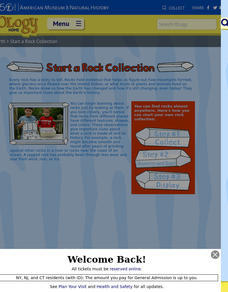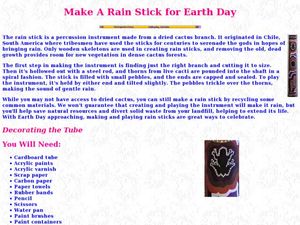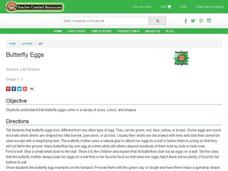August House
Stone Soup
Sharing and cooperation are difficult skills for kindergartners to grasp. Using the story Stone Soup and a series of activities, kids learn about the benefits of working together, categorizing and comparing items, and eating healthy foods.
California Academy of Science
Fish Forms
I've said it before, and I'll say it again, you can add art to any lesson! While little learners are discovering why fish have specific body parts such as, scales, fins, and gills, they start making three-dimensional fish forms. Children...
Curated OER
A Math Board Game
Math is fun with a board game printable set. After printing the pieces and board for the game, have your kids play in groups to practice concepts such as operations and arithmetic formulas.
US National Library of Medicine
Mental Health Awareness Project
Here is a thoughtful group assignment for researching mental health disorders. Team members focus on a different aspect of a chosen disorder: symptoms, treatments, and community resources.
English With Jennifer
Design Team Challenge: A Pair Activity to Practice Prepositions of Place
Test your pupils' skills with indoor decorating while finding out how well they understand prepositions of place. After practicing living room vocabulary, pairs furnish a room by drawing in items. They then present their room to the...
Resources for Educators
Math & Science Connection
Whether you're using a collection of Dr. Seuss books to teach basic math skills like counting, adding, and subtracting, or exploring the different states of matter by melting a crayon with a hairdryer, a series of 11 fun activities...
Mathematics Vision Project
Geometric Figures
Logical thinking is at the forefront of this jam-packed lesson, with young mathematicians not only investigating geometric concepts but also how they "know what they know". Through each activity and worksheet, learners wrestle with...
Garden Earth Naturalist Club
Parts of a Flower! Flower Dissection
Sometimes the best way to learn about plants is to see the different parts of a plant yourself. Groups of learners dissect flowers to answer questions about what they observe and what they wonder about their flower.
San Diego Museum of Art
Tapa-Inspired Pattern Painting
Middle schoolers are encourage to try their hand at traditional Oceania tapa art by crafting their own cloth using brown paper bags. Included in the resource is background information about the cultures of Oceania and their art.
Project Articulate
Textured Landscapes with Grant Wood
Explore the world of textured landscapes through the eyes of the famous artist, Grant Wood. Here is an elementary art lesson in which scholars learn about Grant Wood's life, view his work, draw their own textured landscape, and then...
Southwestern Medical Center
A Classroom Demonstration of Protein Folding
Does the mention of proteins and polypeptide relationships in your classroom result in mass confusion? Does the attempt to teach this important concept generate multiple questions and, at times, lead to a room filled with blank stares?...
NOAA
Motion from the Ocean
Create a fish mobile using cardboard and string to hang in the classroom while studying ocean life. Each printable requires pupils to cut out two of the same fish to create consistency on the front and back.
K5 Learning
Rocks
Five short answer questions follow an informational reading passage that details the three different types of rocks—sedimentary, igneous, metamorphic—and their rock cycle.
Steve Spangler Science
Boo Bubbles Bouncing Smoke – Dry Ice Bubbles Experiment
Don't let your lesson plans go up in smoke—unless they include Boo Bubbles, of course! An engaging laboratory mixes liquid soap and dry ice to create smoky bubbles that burst on impact, making it the perfect way to celebrate Halloween in...
American Museum of Natural History
Atomic Mobile
Structure an activity around atoms. Learners use their knowledge of the parts of atoms—the protons, neutrons, and electrons—to build a model of a carbon atom. Scholars create a nucleus by using clay balls to represent the protons and...
American Museum of Natural History
Feed the Birds
What kinds of birds are common in the area? Young scientists use household supplies to create bird feeders. They then document the birds that come to their feeders by keeping journals.
American Museum of Natural History
What's This? Staying Safe
Amaze the class with the creative adaptations species employ to trick predators. An online interactive lesson introduces learners to six different species with unique adaptations. Each species highlights a different adaptation and its...
American Museum of Natural History
What's This? Colorful Creatures
An online resource shows learners some species that are very good at using their camouflage as well as other ways species use their coloring for survival. Interactive and digital, the lesson is perfect as a remote learning resource.
American Museum of Natural History
Start a Rock Collection
Rocks hold evidence of Earth's past. A three-step guide describes the process of creating a rock collection. It provides a data collection sheet to make notes about each sample.
American Museum of Natural History
Piecing It All Together
Archaeology digs are much like giant jigsaw puzzles. The artifacts found are often in pieces and scientists must reconstruct them. A hands-on activity lets young archaeologists experience this facet of the job as they create, smash, and...
American Museum of Natural History
Feed the Birds
Scholars use a large carton, string, an emery board, and bird food to create a hand-made bird feeder. After completing the craft, pupils keep a journal to track their observations.
Curated OER
Make a Rain Stick for Earth Day
Students construct rain sticks. In this ecology multicultural lesson plan, students use recyclable items to construct a rainstick. Detailed instructions for making and decorating the rainstick are given.
Curated OER
MEDIA COLLAGE
Learners use old magazines to create a collage. They may focus on elements of design. They discuss their collage or they may write a brief essay.
Curated OER
Butterfly Eggs
Students make butterfly eggs. In this butterfly lesson, students discuss the differences between butterfly eggs and other eggs. Students learn how butterflies lay their eggs and then make butterfly eggs out of clay.
Other popular searches
- Shapes and Colors
- Spanish Colors and Shapes
- Adjectives Colors and Shapes
- Sorting Shapes and Colors
- Animals Colors and Shapes
- Animal Colors and Shapes
- Teaching Colors and Shapes
- Colors and Shapes Preschool
- Identfying Colors and Shapes
- Geometric Shapes and Colors
- Shapes and Color Words
- Shapes and Colors in Spanish










